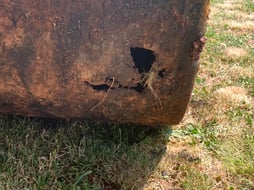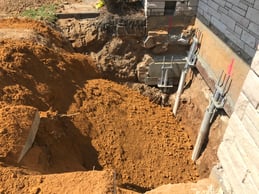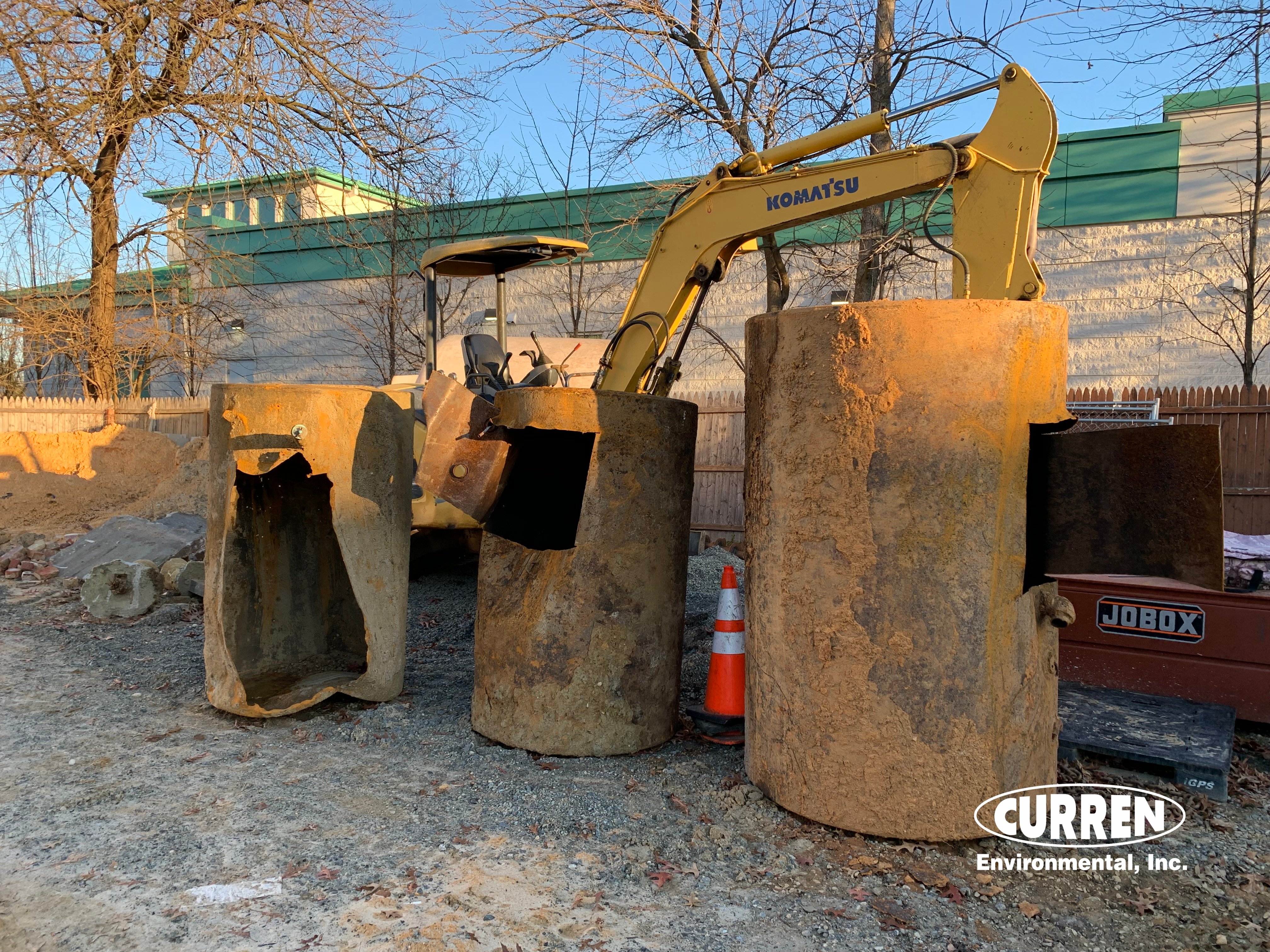Oil Tank Removal Near Me
A popular search string regarding oil tanks is Oil Tank Removal Near Me. Clearly, if you search that string, you have a tank you want to be addressed. Curren Environmental is licensed in 3 states to remove tanks and the following link can provide you with what you need: But if you want to educate yourself regarding oil tanks and learn fact from fiction, from scams continue reading this web page, it answers the most common and important questions regarding oil tanks. Oil Tank Removal Near Me
Every oil tank removal has a dark side and that dark side is if the tank leaks. Most companies will not discuss this topic, for fear of scaring off potential victims, that is potential clients. Compound that with misinformation regarding environmental regulations and oil tanks.
Curren has over 30 years dealing with tanks and holds licenses in 3 states. The following includes common frequently asked questions regarding oil tanks.
Environmental regulations apply to both commercial and residential property owners, meaning contamination on a residence is not exempt from regulations that require remediation of said contamination. This page is meant to provide professional guidance for heating oil tank leaks.
Who can remove a heating oil tank?
In Delaware and Pennsylvania, you do not need to use a licensed company, although many municipalities want the contractor to obtain a local license to work in the town to ensure they meet minimum standards, like insurance and maybe even a license which many companies have for regulated or commercial tanks. PA & DE, if the company is licensed for commercial tanks, you can expect they are qualified for oil tanks.
New Jersey 100% requires a closure-certified individual working for a closure-certified UST firm is required to remove underground UHOTs.
My tank was abandoned in place by a certified contractor who obtained all of the required permits from the municipality. Does that guarantee that my tank did not leak?
No. There are many situations where an underground storage tank, abandoned in place in accordance with the municipal regulations actually leaked. Know that any local municipal permit is for the physical activity of the work, i.e., removal or abandonment in place. No local inspector has the authority to certify that a tank did or did not leak.
Does a heating oil previously abandoned underground storage tank on a property need to be removed? Meaning the tank such as the question above was filled in place and there is a permit approving the work.
(This has a two part answer)
1. If you have a report, with soil samplers clearly stating the tank did not leak, you are likely ok. You can't assume from your unprofessional review of tank data that the tank did

not leak, it has to state in the documentation that the tank did not leak and how that conclusion was derived. You want really strong documentation that the tank did not leak, which has been a common SOP for commercial sites since the 1990's, for residential not so common as homeowners often do not want to find a problem, so why test?
Public service announcement!
You can email your data for a free review by Curren Environmental if the project was performed in NJ, DE or PA where we are licensed. Simply email the data to info@currenenvironmental.com with the address in the subject field.
2. 80% of the time with tanks abandoned in place you will not have documentation stating the tank did not leak that would be acceptable. This relates to the 1st part of our answer which referenced that people likely abandoned the tank because they did not want to remove it and find holes in the tank. So while a law is not in place requiring removal (assuming you got a permit to abandon the tank previously), who is going to buy a house with an undocumented tank? Considering that when a tank leaks cleanup can cost over $10,000 and a $70,000 cleanup is also not out of the question, the answer is yes. As a buyer would you want to buy a property with that kind of risk? As a seller, if you are sane, you likely would not want to deal with a tank leak cleanup, but you must think like a buyer.

However, it is not uncommon for real estate or other professionals to recommend that a tank be removed in preparation for the sale of a home.
While the federal government regulates commercial fuel tanks such as gasoline or diesel fuel, Heating oil underground storage tanks that service residential buildings are unregulated. But when a heating oil tank leaks, then it is reportable to NJDEP, PADEP or DNREC, and remediation of the leak is required. These state environmental agencies will oversee or review reports documenting work performed to address the tank leak.
Individual property involvement by any state environmental agency only occurs if the tank leaks. DNREC does like to have personnel on site when a UST is removed. NJDEP has periodic spot inspections of tank removals to ensure tank contractors have properly licensed personnel on site and as a 3rd party to ensure that a non-leaking tank is not represented as leaking and yes there are many tank contractors that are not as moral and ethical as they should be, hey its New Jersey.
Do I need to obtain a permit for a previously abandoned tank?
Yes, don’t believe me, call the township, perhaps they do not require a permit. But when you get a permit, the town will require a licensed company too do the work, because if you remove and a leak is found you want a licensed company to address the leak.
How can I tell there is a problem with my heating oil tank?
Signs that indicate there is a problem with your heating oil tank include can include the following:
- Unexpected or unexplained oil consumption increase that does not appear to coincide with prolonged cold weather or increased heating system usage.
- You are finding water in the tank on multiple occasions. Water can also cause problems with your heater as water can get sucked to the heater and water will not combust.
- Oil coming up out of the ground, which is caused by water entering tank and forcing oil up and out.
- Oil showing up in your basement or sub pump.
- oil staining on basement walls or floors adjacent to the tank;
- Your tank is out of warranty (typically 10 to 20 years old), because with cars things start breaking after the warranty ends.
Lastly, since many tanks leak from the very bottom of the tank, oil leaks down and out, and water never enters the tank because the holes are on the bottom of the tank not the top, so there would be zero evidence of a leak. Sorry had to cover all bases.
Environmental work is expensive how do I know I am getting a fair price?
When you say expensive, what did the environmental cost the last time you had it performed? My point is that a car is expensive, but you likely have bought a car before. Be smart, a 10k remediation is not out of line, but yes, I think 10k is a lot of money, expensive? Depends on what is performed. To be a smart consumer any business should employ fair and reasonable pricing and business practices in all of its dealings with clients, including a written contract that contains the following provisions:
- A clear description of the work activities to be performed.
- Lists of all materials, equipment, tools, and other incidentals anticipated to be necessary for the execution of the proposed work activities.
- A project manager will be on-site for soil sampling and subsequent report.
- A budget contract price, listing what is NOT INCLUDED. Exclusions are typical liquid disposal at a per gallon cost and government permit fees as they vary.
- What if language in case something arises, so you can discuss scenarios of what if and be prepared and not surprised. Beware many companies want to surprise you after you hire them surprises are expensive.
- Estimated time frames for the completion of the work activities listed in the contract; and
- A listing and description of all services in the contract that exceed the requirements of the applicable local, State, or Federal rules and regulations.
Who is allowed to remove an aboveground storage tank?
In DE & PA a licensed contractor, which is broad and does not provide a level of comfort that they are qualified and will do a good job. Go visit any company's site and look for web pages detailing that they actually do remove ASTs. The AST closure service web pages should have photos lots of photos, if you do the service you will promote it and have many photos of past jobs.

In NJ a licensed HVAC contractor, a NJ licensed plumbing contractor, yes even a homeowner (although from our experience they do a terrible job, or NJDEP tank contractor can remove an aboveground oil tank. Pro Tip in NJ if the contractor only has a Home Improvement Contractors (HIC) registration they cannot remove an aboveground oil tank.
The following is Related to NJ UST's.
Should I use an LSRP to conduct a heating oil tank cleanup?
No, you should not, an LSRP is designed for commercial and more complex sites, which cost more. An LSRP so to speak is overqualified and will end up costing more than if you only dealt with a SSE (subsurface evaluator, a license in NJ that allows a person to collect soil samples). In NJ investigate/remediate a leaking UHOT, environmental professionals must either be a certified subsurface evaluator (SSE) working for an UST Firm certified in subsurface evaluation or be a Licensed Site Remediation Professional (LSRP). Once the discharge is identified, the SSE is required to be present when sampling or excavation takes place.
My property has an open municipal permit, and the municipality is requiring a NFA letter to close the permit. How do I get a NFA letter?
For an unregulated heating oil tank (UHOT), the DEP issues No Further Action letters when a discharge is discovered, and a remediation is implemented. If a UHOT is closed and there is no evidence of a discharge and the tank passes the municipal inspection, there is no need for an NFA letter.
This question assumes the inspector noted that the tank leaked, and they are asking for documentation that is was cleaned up. We have also seen open permits because the tank removal was not inspected as required by the municipal inspector. The inspector would like to see the tank removed from the ground and the excavation where the tank was extracted from. Some contractors backfill the hole or remove the tank from the site prior to the inspector being on-site, either on purpose (to hide a tank leak) or by accident and the inspector will hold up closing the permit until municipal reequipments are met.
How many soil samples are needed for an Unregulated Heating Oil Tank?
The requirements for sampling are found in the Heating Oil Tank System Remediation Rules, N.J.A.C. 7:26F.
Two samples for tanks up to 500 gallons
Three samples for 1000 gallon tanks
If the tank leak:
-
If any evidence of a heating oil release (i.e.: holes in the tank, petroleum odors or sheens; stained soils; free product; detectable petroleum levels in site assessment soil samples; etc.) is noted during the closure, as per the revised NJDEP oil tank regulations (August 6, 2018) two required actions are triggered.
-
First, the owner must report the release to the NJDEP by calling the Incident Hotline (877.WARNDEP). This action will generate an NJDEP Case # documenting that a leak occurred at the subject address.
-
Second, the number of required soil samples has changed. For tanks, 500 gallons and smaller 5 soil samples are required. For a 1,000-gallon tanks and larger 6
For a discharge from an aboveground tank at least 2 samples will need to be collected though the actual number of samples will depend on the size of the excavation.
If my soil sample comes up below 1000 mg/kg for extractable petroleum hydrocarbons (EPH), what work do I still need to do?
Once a discharge is discovered, the Heating Oil Tank System Remediation Rules (N.J.A.C. 7:26F) require the collection of at least 5 samples from the excavation (one at each sidewall and one at the base) depending on the size of the excavation. If the appropriate number of samples were collected and the results for all the samples were less than 1,000 mg/kg for EPH then no further remediation of soils is required. The number of samples increases to 6 if the tank is 1000 gallons.
How long does it take the DEP to issue a NFA letter?
Depending on the volume of reports in-house, typically the DEP takes about 2-4 weeks to review a complete package (Remedial Action Report and UHOT form via email along with a paid fee). If there are no deficiencies, the DEP will issue the NFA letter and send the NFA to the tank owner and the environmental professional via email. If there are deficiencies, the DEP will reach out to the environmental professional to resolve any issues.
When does the NJDEP need to be notified of a leaking tank?
Upon discovery of a discharge, the DEP must be notified immediately (within 15 minutes) by reporting the discharge to the hotline at 1-877-WARNDEP (1-877-927-6337). The homeowner or contractor can report the leaking tank.
Tank Questions? Call the Experts
888-301-1050

